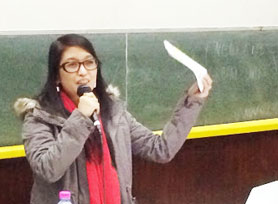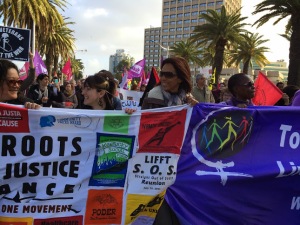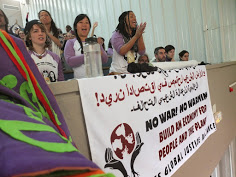
Max Rademacher of Alternatiba led GGJ’s “up with the People” chant in French, alongside Cindy in English at Climate Convergence in Tunis.
UP with the People! Yeah, Yeah!
And DOWN with Corporate capture! Boom Boom!
Keep Our Fossil Fuels In the Earth! Yeah Yeah!
And Throw Out False Solutions! Boom Boom!
Chanting on that last day of the World Social Forum at the Climate convergence, hundreds packed the lecture hall of the University of Tunis El Manar demanding “System Change, Not Climate Change!” From the mix of activists, intellectuals, organizers and climate change champions, the goal was clear: stop the fossil fuel industry’s corporate control of our planet. Reporting back on the four days of lessons and strategies shared throughout the Climate Space*, paving the “Road to Paris” where COP 21 will happen in Paris on December 12th. As the 21st session of Conference of the Parties (COP 21) to the United Nations Framework Convention on Climate Change (UNFCCC), an international inter-government agreement on climate solutions.
What has played out in the last 20 years, however, are regressive agreements and a convening “meant to protect the climate and commit to take action” says Mary Louise Malig, Campaigns Coordinator and Research Associate of the Global Forest Coalition, “but somehow, beginning with the Kyoto Protocol and all those carbon markets, that [purpose] was lost…to corporate interests and keeping business as usual.”
With such distrust in the system that is heavily dictated by corporate greed and extraction, why would we engage in this International process? What opportunity does this climate negotiation in Paris risk and offer? I got a chance to hear from Cindy Wiesner, National Coordinator of Grassroots Global Justice Alliance (GGJ) and Mary Louise Malig to understand what’s at stake, what can we expect, and what we can do both in the Global North and the Global South.
Interviewer: So what’s at stake with COP 21?
Cindy Wiesner, United States (CW): What’s at stake is really the future of humanity and the planet, there has been 20 years of these negotiations between heads of states trying to come to agreements that could actually roll back the impact we are having on the planet.

Mary Lou Malig speaking at the Climate Convergence at the 2015 World Social Forum.
Mary Louise, Philippines (ML): At the forefront of climate change, [we are] suffering the very real impacts of climate change because science, evidence and reports all show that the weather is becoming more extreme, oceans are warming and there is more and more drought, more and more extreme typhoons. I think it’s really important that we, especially from the perspective of those who are at the forefront of climate change, that there is real systemic action taken to address climate crisis, to prevent marching into climate chaos. The danger with Paris is that it has the potential to lock us into a deal that will burn the planet.
CW: We’ve also been seeing corporate capture of the climate negotiations; we’ve seen that with the WTO, we’ve seen that with free trade agreements. We’ve seen that in the last few years with more and more influence of corporations into the climate negotiations. You have the World Bank, McDonalds, and Coca Cola, Monsanto talking about…being a part of the “green future” and we need to unmask what that really is: a cooptation of the current moment to make much more profit and to keep controlling issues of land, water and air.
ML: The UNFCCC, if they agree to a bad deal in Paris it’s going to have implications for years and years to come…the current text on the table shows that what they are proposing [are] not real emission cuts, they don’t want to touch the fossil fuel industry, what they want to do is to come up with more false solutions. And there are false solutions: carbon-markets, where they will create offsets, more carbon markets, more systems of cheating Mother Nature basically. And then you have REDD+, which is clearly a way to just sell off as much forest as they can until there are no more forests to sell. There’s a new one which they are proposing which is called climate-smart agriculture, which is basically a way to open a window for carbon markets to enter into agriculture.

Cindy Wiesner during the Climate Space meetings in Tunis. photo by Christian Losson of Libération Terre Fr.
CW: We’re seeing a blueprint of this agreement in the United States with President Obama’s Clean Power Plan, which has no clear commitments to emissions reduction, decentralized way [for] states to decide whether or not and how they want to implement, and no language around environmental justice principles or policies… Obama’s Clean Power plan is putting fracking as an option, nuclear as an option, and we know the devastating impacts in communities and worldwide. Earthquakes where there have never been earthquakes before, and the U.S. taking up water and precious resources and the devastating impacts it’s doing to communities. This is what the U.S. government is going to bring to the climate negotiations on an international level…new forms of advancing capitalism but painting it green.
ML: and then you have the technological fixes…like geo-engineering, which is the manipulation of the atmosphere, like [mimicking volcano eruptions], painting the desert white so it reflects more sun out into the atmosphere, or putting sulfur into the ocean, etc. It’s really crazy if you hear all these different proposals [like] industrial bio-energy, which they are calling “renewable” but is basically burning off forests in order to replace fossil fuels. If they open the door to all these carbon markets and false solutions we’re going to be locked into a decade of no real emission cuts, there going to keep burning fossil fuel, keep digging oil, and the way they are going to “address” it is they are going to offset, [carbon] trade, introduce all these genetically modified organisms, geo-engineering.
CW: So it’s clear, the battle this year is around what vision of humanity and which vision of the planet we want to have, it’s our job as social movements to really articulate that vision of those solutions that are coming from impacted peoples, impacted nations that are coming together to articulate a much more cohesive strategy around what to do…for that different vision and impact from the inside , outside and beyond these negotiations.
I: So what’s next? What can we expect?
CW: Right now there are plans for the Road to Paris that we’ve been mobilizing toward for years, such as a global mobilization that’s been called for May 30th and 31st to raise up our critique of the fossil fuel industry, and there’s a second date of action the week of September 26th to be able to lift up real solutions and alternatives. There have been mobilizations called for in November right before the COP 21 in Paris, and a call for decentralized actions all over the world in the different capitals to come together around sending that clear message to the UNFCCC, followed by an escalation of actions endings on December 12th in Paris.
I: Finally, what do you see as the role of those in the US and the Global North, and what leadership and coordination do we need with the Global South?
ML: We need to fight back, we need to push back, we need to really mobilize from now until Paris and beyond and really push for People’s solutions and People’s alternatives and really be supporting local struggles because it has to be multi-level. We are targeting international policies because that’s an important space and we don’t want to get locked into a bad deal, but we also need to be supporting, equally, all the local struggles that are also going on…because those victories will help us in pushing back these corporate interests.

Led by grassroots communities of color, over 400,000 people filled the streets of New York on Sept 21, 2014 to protest the UN 2014 Climate Summit. Photographer: Timothy Fadek/Bloomberg
CW: From Idle No More to the fast food strikes to the solidarity of non-Black folks with Black Lives Matter movement. In the US we have an incredible reimagining and recapturing of our radical roots. And people are really beginning to think of things with a vision, a vision of an alternative economy a different way of living, a different system other than capitalism, and people really beginning to connect their issues, their day to day issues to something more systematic.
ML: The key thing is to maintain and strengthen the solidarity between all of our movements…[to] strengthen the solidarity and coordination of our struggles so we can support each other North and South, build on each other’s strength, learn from each other’s struggles, and share strategies. * The Climate Space began as a venue at the World Social Forum 2013 in Tunisia to discuss the causes and impacts of climate change as well as the struggles, alternatives and strategies to address climate change.




















